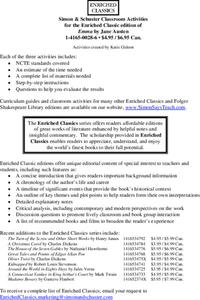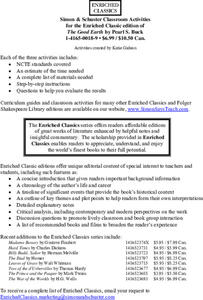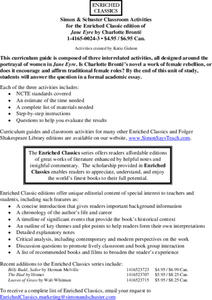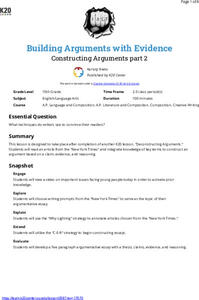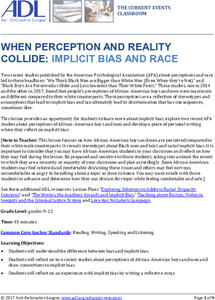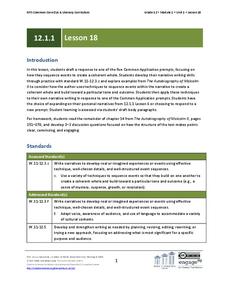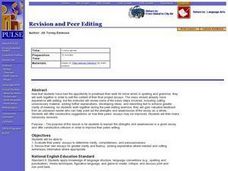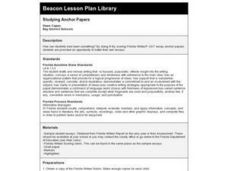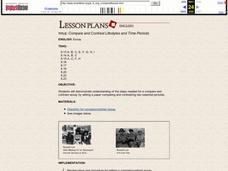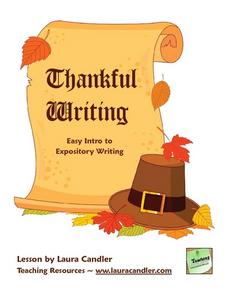New York City Department of Education
Grade 3 Literacy: Investigating Sharks
Shark! Scholars read about sharks in Facts about Sharks by Susanna Batchelor. They then pretend they are shark scientists and choose a shark they want to study. Learners research their sharks and record information in graphic organizers...
PBS
The Symbolism of Castle's Bedroom in Ghost
To conclude a unit study of Jason Reynold's Ghost, class members examine how Castle's feeling about his bedroom change over the course of the novel. Groups use the provided graphic organizer to identify the plot of the novel and then use...
Digital Public Library of America
Their Eyes Were Watching God by Zora Neale Hurston
Zora Neale Hurston's novel Their eyes Were Watching God has been highly praised and severely criticized for its depiction of African American folk culture. A set of primary source materials, including photographs, articles, essays, and...
Simon & Schuster
Classroom Activities for Emma by Jane Austen
Coldhearted snob or warm and caring? A series of activities prepares scholars to evaluate the main character in Jane Austen's Emma. To begin, class members compare the gender expectations for women in Regency England and those of today....
Simon & Schuster
Classroom Activities for The Good Earth by Pearl S. Buck
An 11-page packet includes three activities to engage pupils in reading Pearl S. Buck's The Good Earth. To understand the historical context, class members research a list of topics related to Chinese history and culture. They then...
Simon & Schuster
Classroom Activities for Jane Eyre by Charlotte Brontë
A curriculum guide for Jane Eyre focuses on Charlotte Bronte's portrayal of women. Readers engage in three activities that prepare them for an essay in which they argue whether the novel is a work of female rebellion or affirms...
Center for History Education
Where Did Thomas Jefferson Stand on the Issue of Slavery?
Thomas Jefferson was a complicated man with a complex legacy. Middle schoolers examine a series of primary source documents to gather evidence for an essay in which they answer where Jefferson stood on the issue of slavery.
K20 LEARN
Building Arguments With Evidence: Constructing Arguments Part 2
The second session in the two-part "Building Arguments with Evidence" lesson asks scholars to craft an argument essay on a topic of interest to them. Writers establish a claim, locate evidence, and justify their stance.
K20 LEARN
Introduction to Arguing Effectively: Argument Writing
Which is better—Chick-fil-A or MacDonalds? High schoolers learn how to craft an argument essay by beginning an opinion statement. They state a claim, back up their claim with evidence, and consider counter calms. Scholars then create a...
Anti-Defamation League
What Is the Dream Act and Who Are the Dreamers?
The DREAM Act (Development, Relief, and Education for Alien Minors Act) is the focus of a lesson that asks high schoolers to investigate the act's provisions and read statements by individuals who support and oppose the act. They then...
Anti-Defamation League
Should Washington's NFL Team Change Their Name?
"What's in a name?" Is it irrelevant, as Juliet suggests in Shakespeare's play, or is nomenclature deeply significant? Young scholars weigh in on the debate by examining the controversy over the NFL's Washington, D.C. Redskins. Groups...
Anti-Defamation League
When Perception and Reality Collide: Implicit Bias and Race
The big idea in this instructional activity is that implicit bias often clouds perceptions. High schoolers watch a short video, read research articles, and engage in discussions about implicit bias and how these biases lead to...
EngageNY
Grade 12 ELA Module 1: Unit 1, Lesson 28
After discussing Haley's techniques in his conclusion of The Autobiography of Malcolm X, class time is devoted to drafting, sharing, and getting feedback on writers' college essays.
EngageNY
Grade 12 ELA Module 1: Unit 1, Lesson 24
Today's discussion of The Autobiography of Malcolm X focuses on the precise words, the telling phrases, and the sensory details Haley uses to enliven his story. Writers then work to incorporate these same techniques in the draft of their...
EngageNY
Grade 12 ELA Module 1: Unit 1, Lesson 18
Class members take a break from discussing The Autobiography of Malcolm X to focus on their personal narrative essays. Before working on their drafts, they review what they have learned from their study of Haley's narrative about...
Curated OER
Narration about the Mirabal Sisters
Learners research the lives of the Mirabel sisters, complete related graphic organizers, and watch the movie, "In the Time of the Butterflies." They write a narrative essay about one event in the Mirabel sisters' lives.
Curated OER
Outline a Travel Narrative
Fourth graders are taught how to outline a fictional narrative essay. They review the definition and structure of narrative essays. Students use the activity to brainstorm specific ideas for narrative essays. They are given a...
Curated OER
Learning About Hurricanes
Students write a research paper on hurricanes. In this weather lesson, students use a science text book to write down facts about hurricanes on note cards and then outline their essay. Students use the outline to create an organized essay.
Curated OER
Introductions and Conclusions
Ninth graders explore the techniques for writing an effective introduction and concluding paragraph in their academic essay. They create an outline of where they plan to take the reader and explore the methods for creating an...
Curated OER
Language Arts: Revision and Peer Editing
Students are able to evaluate their peers' essays to determine clarity, completeness, and persuasiveness. They are able to revise their own essays for greater clarity and fluency, adding explanation where needed and cutting extraneous...
Curated OER
Characters in Nathaniel Hawthorne's Stories
Students read literature by Nathaniel Hawthorne and write an essay comparing the main characters in the two stories. In this character analysis activity, students read the stories Young Goodman Brown and The Minister's Black Veil....
Curated OER
Studying Anchor Papers
Students examine the Florida Writes! Rubric and discuss the basic elements of the scoring system. In small groups, they use the rubric to discuss and score several student essays.
Curated OER
COMPARE AND CONTRAST LIFESTYLES AND TIME PERIODS
Eighth graders demonstrate the steps needed for a compare and contrast essay by writing a paper comparing and contrasting two selected pictures.
Curated OER
Thankful Writing
Students go through the entire writing process to create an expository essay about what they are thankful for. They use graphic organizers to guide them through the process.
Other popular searches
- Expository Essays
- Compare & Contrast Essays
- Narrative Essays
- Narrative Essay Writing
- Writing Essays
- Comparative Essay
- Literary Essays
- Personal Essays
- Photo Essays
- Four Paragraph Essays
- Famous People Sports Essays
- Narrative Essay Prompts





